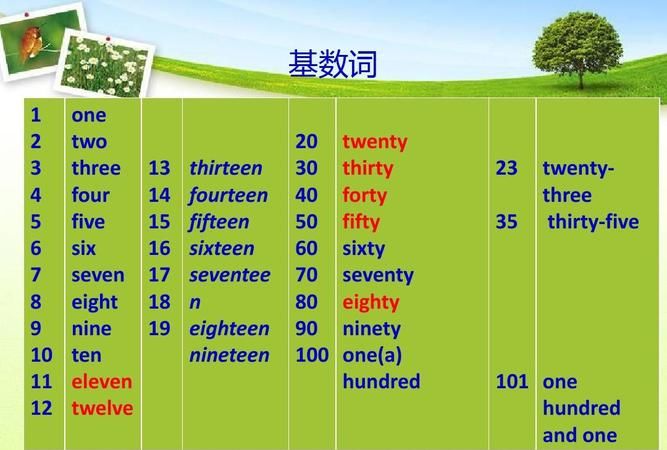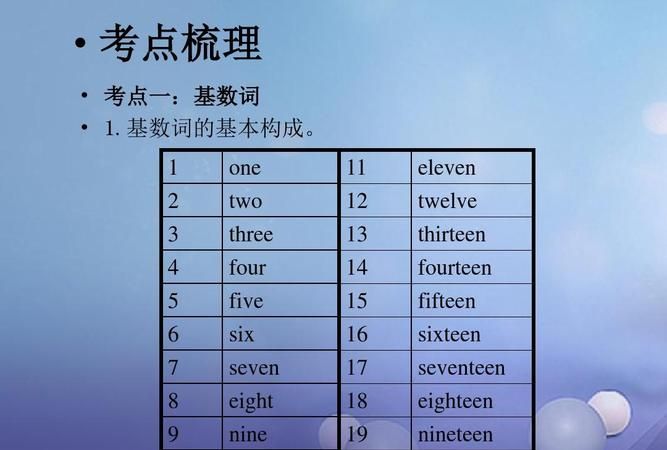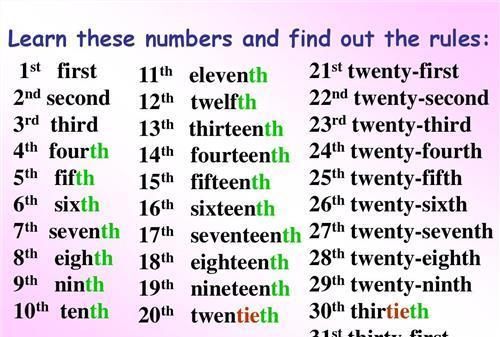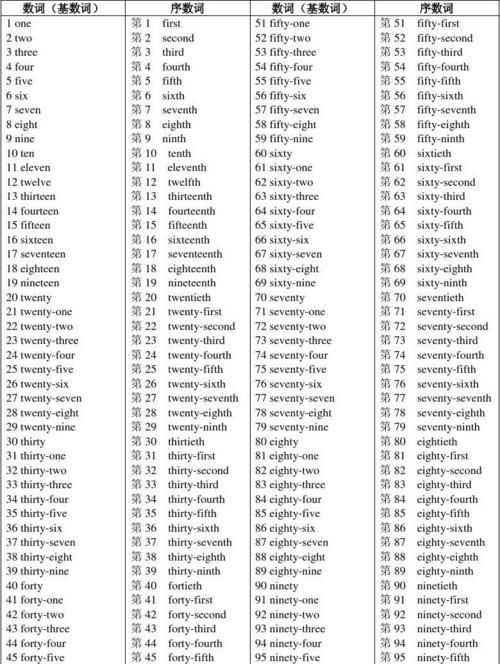本文目录
人教版七年级下册英语单词unit4
七年级下册英语单词表:Unit4附音标
rule规则;规章n./ru:l/
arrive到达v./Eraiv/
on time准时
hallway走廊;过道n.
hall大厅;礼堂n./hR:l/
dining餐厅/dainiN/
listen听;倾听v./lisn/
listen to听……
fight打架;战斗v.&n./fait/
sorry抱歉的;难过的;惋惜的adj./sRri/
outside在外面;外面的adv.&adj./autsaid/
wear穿;戴v./wZE/
important重要的adj./impR:tEnt/
bring带来;取来v./briN/
have to 必须;不得不
uniform校服;制服n./ju:nifR:m/
quiet安静的adj./kwaiEt/
out外出adv./aut/
go out外出(娱乐)
practice练习v.&n./prAktis/
dish碟;盘n./diF/
do the dishes清洗餐具
before在……以前;以前prep.&adv./bifR:/
make ones、bed铺床
dirty脏的adj./dE:ti/
kitchen厨房n./kitFin/
more更多(的)adj.&pron./mR:/
noisy吵闹的`adj./nRizi/
relax放松;休息v./rilAks/
read读;阅读v./ri:d/
terrible非常讨厌的;可怕的adj./terEbl/
feel感受;觉得v./fi:l/
strict严格的;严厉的adj./strikt/
be strict(对某人)要求严格
remember记住;记起v./rimembE/
follow遵循;跟随v./fRlEu/
follow the rules遵守规则
luck幸运;运气n./lQk/
keep保持;保留v./ki:p/
hair毛发n./hZE/
learn学习;学会v.
七年级英语知识点总结
1.基数词的用法。
数词分为两大类:基数词和序数词,表示“多少”的为基数词;表示“第几”的为序数词。基数词有zero, one, two等。序数词我们刚学了一个“first”(第一)。其中基数词的用法如下:
(1)表示数字、年龄、日期等,在剧中可作主语、定语和表语。
—What’s two and five?二加上五等于几?
— Seven七(表示数字)
—How old is it ?它几岁了?
—It’s four.它四岁了。(表示年龄)
—What’s the date today?今天几月几日?
—It’s October 3. 10月3日。(表示日期)
(2)表示编号:Lesson One第一课Unit One第一单元
(3)表示号码,如电话号码、门牌号、身份证号等,按单个基数词读出。0可以读成字母o的读音或zero,相连的相同两位数可以读成double(双写的)+基数词。
(4)表示时刻:8::00 = eight o’clock 8点钟
2.汉语名字在英语中的写法
中国人名是姓在前,名在后。姓和名的首字母都要大写且中间空一格,若名为两个字,中间不加空格,只需第一字的首字母大写。 Zhang Ling张玲Liu Yifei刘亦菲
七年级英语知识点总结
1、 (see 、hear 、notice 、find 、feel 、listen to 、 look at (感官动词)+do eg:I like watching monkeys jump
2 、(比较级and比较级)表示越来越怎么样
3、 a piece of cake =easy小菜一碟(容易)
4、 agree with sb赞成某人
5、 all kinds of各种各样a kind of一样
6 、all over the world = the whole world整个世界
7 、along with同……一道,伴随…… eg : I will go along with you我将和你一起去
the students planted trees along with their teachers学生同老师们一起种树
8 、As soon as一怎么样就怎么样
9、 as you can see你是知道的
10 、ask for ……求助向…要…(直接接想要的东西) eg : ask you for my、book
11 、ask sb for sth向某人什么
12、 ask sb to do sth询问某人某事ask sb not to do叫某人不要做某事
13 、at the age of在……岁时eg:I am sixteen I am at the age of sixteen
14、 at the、beginning of …… ……的起初;……的开始
15、 at the end of +地点/+时间最后;尽头;末尾eg : At the end of the day
16 、at this time of year在每年的这个时候
17、be /feel confident of sth /that clause +从句感觉/对什么有信心,自信
eg : I am /feel confident of my spoken English I feel that I can pass the test
18、be + doing表:1现在进行时2将来时
19、be able to (+ v原) = can (+ v原)能够…… eg : She is able to sing She can sing
20、be able to do sth能够干什么eg :she is able to sing
21、be afraid to do (of sth恐惧,害怕…… eg : I'm afraed to go out at night I'm afraid of dog
22、be allowed to do被允许做什么
eg: I'm allowed to watch TV我被允许看电视I should、be allowed to watch TV我应该被允许看电视
23、be angry with sb生某人的气eg : Don't、be angry with me
24、be angry with(at) sb for doing sth为什么而生某人的气
25、be as…原级…as和什么一样eg : She is as tall as me她和我一样高
26、be ashamed to
27、be away from远离
28、be away from从……离开
29、be、bad for对什么有害eg : Reading、books in the sun is、bad for your eyes在太阳下看书对你的眼睛不好
30、be、born出生于
31、be、busy doing sth忙于做什么事be、busy with sth忙于……
32、be careful当心;小心
33、be different from……和什么不一样
34、be famous for以……著名
35、be friendly to sb对某人友好
36、be from = come from来自eg:He is from Bejing He comes from Bejing Is he from Bejing ? Does he come from Bejing ?
37、be full of装满……的be filled with充满eg: the glass is full of water the glass is filled with water
38、be glad+to+do/从句
39、be going to + v(原)将来时
40、be good at(+doing) = do well in在某方面善长,善于……
41、be good for对什么有好处eg : Reading aloud is good for your English
42、be happy to do很高兴做某事
43、be helpful to sb对某人有好处
eg : Reading aloud is helpful to you大声朗读对你有好处
Exercising is helpful to your、bady锻炼对你的身体有好处
44、be in good health身体健康
45、be in trouble处于困难中eg : She is in trouble They are in tronble
46、be interested in对某方面感兴趣
47、be late for = come late to迟到eg: Be late for class上课迟到
48、be like像…… eg : I'm like my mother
49、be mad at生某人的气
50、be made from由……制成(制成以后看不见原材料)
51、be made of由……制成(制成以后还看得见原材料) 52、be not sure表不确定
53、be on a visit to参观54、be popular with sb受某人欢迎
55、be quiet安静56、be short for表缩写eg:陶is short for陶俊杰
57、be sick in、bed生病在床58、be sorry to do sth、be sorry for sb eg : I am sorry for you
59、be sorry to hear that 60、be sorry to trouble sb eg : I am sorry to trouble you
61、be strict in doing sth严于做某事eg : He's strict in obeying noles
62、be strict with sb对某人要求严格eg: Some students are not strict with them selves这些学生对自己不严格
63、be strict with sb in sth某方面对某人严格64、be supposed to do被要求干什么
65、be sure表确定66、be sure of doing sth对做某事有信心eg: He is sure of winning I am sure of learning English well
67、be sure of sth对做某事有信心eg: I'm sure of my head (my teacher我相信我的大脑(老师)
68、be sure that sth对做某事有信心eg: I'm suer that he can pass the test我相信他能通过考试
69、be sure to do sth一定会做某事eg: We are sure to pass the test我们一定会通过这次考试We are sure to learn English well我们一定能学好英语
70、be terrified of +名/动doing害怕……
71、be terrified to do sth害怕做某事
72、be the same as …和什么一样
73、be used to doing sth习惯做某事
eg: My father is used to getting up early我爸爸习惯早He is used to sleeping in class他习惯上课睡觉
74、be worth doing值得做什么
75、be(feel) afraid to do sth害怕做某事be afraid of sth害怕某物be afraid that丛句
76、because+句子because of +短语
eg : He was late、because he had a headache He was late、because of his headache
77、begin to do = start to do开始做某事start…with…=begin…with…以什么开始什么
eg : Let's、begin the game with the song I、begin to go home
78、between…and…两者之间
79、borrow sth from sb向……借…… lend sth to sb ( lend sb sth借给……什么东西
eg : I、borrowed a pen from him he lent a pen to me ( he lent me a pen
80、both = the same(as) = not different(from)表相同

初一英语语法大全知识点总结
初一英语语法虽然是从简单的一些日常用语出发的,但语法中常会有一些知识点看起来很细小,容易被忽视,但这些知识点掌握不熟练,往往会造成一些语法应用上的错误。因此在学习初一英语语法时,要认真、细心,不要觉得一些地方不重要而得过且过。
下面从几个方面,总结出了初一英语语法,如果要复习英语句法的同学,可以参考一下,
一、初一英语语法——词法
1、名词
A)、名词的数
我们知道名词可以分为可数名词和不可数名词,而不可数名词它没有复数形式,但可数名词却有单数和复数之分,复数的构成如下:
一)在后面加s。如:fathers, books, Americans, Germans, apples, bananas
二)x, sh, ch, s, tch后加es。如:boxes, glasses, dresses, watches, wishes, faxes
三)1)以辅音字母加y结尾的变y为i再加es 如:baby-babies, family-families, duty-duties, comedy-comedies, documentary-documentaries, story-stories
2)以元音字母加y结尾的直接加s。如:day-days, boy-boys, toy-toys, key-keys, ways
四)以o结尾加s(外来词)。如:radios, photos, 但如是辅音加o的加es:如: tomatoes西红柿, potatoes马铃薯
五)以f或fe结尾的变f为v再加es(s)。如:knife-knives, wife-wives, half-halves, shelf-shelves, leaf-leaves, yourself-yourselves
六)单复数相同(不变的)有:fish, sheep, deer鹿子, Chinese, Japanese
七)一般只有复数,没有单数的有:people,pants, shorts, shoes, glasses, gloves, clothes, socks
八)单词形式不变,既可以是单数也可以是复数的有:police警察局,警察, class班,同学, family家,家庭成员
九)合成的复数一般只加主要名词,多数为后一个单词。如:action movie-action movies, pen pal-pen pals; 但如果是由man或woman所组成的合成词的复数则同时为复数。如:man doctor-men doctors, woman teacher-women teachers
十)有的单复数意思不同。如:fish鱼 fishes鱼的种类, paper纸 papers报纸,卷子,论文, work工作 works作品,工厂, glass玻璃 glasses玻璃杯,眼镜, orange桔子水 oranges橙子, light光线 lights灯, people人 peoples民族, time时间 times时代, 次数, chicken 鸡肉 chickens 小鸡
十一) 单个字母的复数可以有两种形式直接加s或’s。如:Is (I’s), Ks (K’s)。但如是缩略词则只加s。如:IDs, VCDs, SARs
十二) 特殊形式的有:child-children, man-men, woman-women, foot-feet, mouse-mice, policeman-policemen, Englishman-Englishmen
B)名词的格
当我们要表示某人的什么东西或人时,我们就要使用所有格形式。构成如下:
一)单数在后面加’s。如:brother’s, Mike’s, teacher’s
二)复数以s结尾的直接在s后加’,如果不是以s结尾的与单数一样处理。如:Teachers’ Day教师节, classmates’; Children’s Day六一节, Women’s Day三八节
三)由and并列的名词所有时,如果是共同所有同一人或物时,只加最后一个’s,但分别拥有时却分别按单数形式处理。如:Mike and Ben’s room迈克和本的房间(共住一间),Mike’s and Ben’s rooms迈克和本的房间(各自的房间)
2、代词
项目 人称代词 物主代词 指示代词 反身代词
人称 主格 宾格 形容词 名词性
第一人称 单数 I me my mine myself
复数 we us our ours ourselves
第二人称 单数 you you your yours yourself
复数 you you your yours yourselves
第三人称 单数 she her her hers herself
he him his his himself
it it its its this that itself
复数 they them their theirs these those themselves
3、动词
A) 第三人称单数
当动词是第三人称单数时,动词应该像名词的单数变动词那样加s,如下:
一)一般在词后加s。如:comes, spells, waits, talks, sees, dances, trains
二)在x, sh, ch, s, tch后加es。如:watches, washes, wishes, finishes
三)1)以辅音字母加y结尾的变y为i再加es。如:study-studies, hurry-hurries, try-tries
2)以元音字母加y结尾的直接加s。如:plays, says, stays, enjoys, buys
四)以o结尾加es。如:does, goes
五)特殊的有:are-is, have-has
B) 现在分词
当我们说某人正在做什么事时,动词要使用分词形式,不能用原形,构成如下:
一)一般在后加ing。如:spell-spelling, sing-singing, see-seeing, train-training, play-playing, hurry-hurrying, watch-watching, go-going, do-doing
二)以不发音e的结尾的去掉e再加ing。如:dance-dancing, wake-waking, take-taking, practice-practicing, write-writing, have-having
三)以重读闭音节结尾且一个元音字母+一个辅音字母(注意除开字母组合如show –showing, draw-drawing)要双写最后的辅音字母再加ing。如:put-putting, run-running, get-getting, let-letting, begin-beginning
四)以ie结尾的变ie为y再加ing。如:tie-tying系 die-dying死 lie-lying 位于
4、形容词的级
我们在对两个或以上的人或物进行对比时,则要使用比较或最高级形式。构成如下:
一) 一般在词后加er或est(如果是以e结尾则直接加r或st)。如:greater-greatest, shorter –shortest, taller –tallest, longer –longest, nicer- nicest, larger -largest
二)以重读闭音节结尾且1个元音字母+1个辅音字母(字母组合除外,如few-fewer fewest)结尾的双写结尾的辅音再加er /est。如:big-bigger biggest, red-redder reddest, hot-hotter hottest
三) 以辅音字母+y结尾的变y为i加er/est。如:happy-happier happiest, sorry-sorrier sorriest, friendly-friendlier friendliest(more friendly most friendly), busy-busier busiest, easy-easier easiest
四)特殊情况:(两好多坏,一少老远)
good/well - better best many/much - more most bad/ill – worse worst
little- less least old- older/elder oldest/eldest far- farther/further farthest/furthest
5、数词 (基变序,有规则;一、二、三,自己背;五、八、九、十二;其它后接th;y结尾,变为i, eth跟上去。) first, second, third; fifth, eighth, ninth, twelfth; seventh, tenth, thirteenth, hundredth; twenty-twentieth, forty-fortieth, ninety-ninetieth
二、初一英语语法——句式
1.陈述句
肯定陈述句 a) This is a book. (be动词)
b) He looks very young. (连系动词)
c) I want a sweat like this. (实义动词)
d) I can bring some things to school. (情态动词)
e) There’s a computer on my desk. (There be结构)
否定陈述句 a) These aren’t their books. b) They don’t look nice.
c) Kate doesn’t go to No. 4 Middle School. d) Kate can’t find her doll.
e) There isn’t a cat here. (=There’s no cat here.)
2. 祈使句
肯定祈使句 a) Please go and ask the man. b) Let’s learn English!
c) Come in, please.
否定祈使句a) Don’t be late. b) Don’t hurry.
3. 疑问句
1) 一般疑问句 a) Is Jim a student? b) Can I help you? c) Does she like salad?
d) Do they watch TV? e) Is she reading?
肯定回答: a) Yes, he is. b) Yes, you can. c) Yes, she does. d) Yes, they do. e) Yes, she is.
否定回答: a) No, he isn’t. b) No, you can’t. c) No, she doesn’t. d) No, they don’t. e) No, she isn’t.
2) 选择疑问句 Is the table big or small? 回答 It’s big./ It’s small.
3) 特殊疑问句
① 问年龄 How old is Lucy? She is twelve.
② 问种类 What kind of movies do you like? I like action movies and comedies.
③ 问身体状况 How is your uncle? He is well/fine.
④ 问方式 How do/can you spell it? L-double O-K.
How do we contact you? My e-mail address is cindyjones@163.com.
⑤ 问原因 Why do you want to join the club?
⑥ 问时间 What’s the time? (=What time is it?) It’s a quarter to ten a.m..
What time do you usually get up, Rick? At five o’clock.
When do you want to go? Let’s go at 7:00.
⑦ 问地方 Where’s my backpack? It’s under the table.
⑧ 问颜色 What color are they? They are light blue.
What’s your favourite color? It’s black.
⑨ 问人物 Who’s that? It’s my sister.
Who is the boy in blue? My brother.
Who isn’t at school? Peter and Emma.
Who are Lisa and Tim talking to?
⑩ 问东西 What’s this/that (in English)? It’s a pencil case.
What else can you see in the picture? I can see some broccoli, strawberries and hamburgers.
11问姓名 What’s your aunt’s name? Her name is Helen./She’s Helen.
What’s your first name? My first name’s Ben.
What’s your family name? My family name’s Smith.
12 问哪一个 Which do you like? I like one in the box.
13 问字母 What letter is it? It’s big D/small f.
14 问价格 How much are these pants? They’re 15 dollars.
15 问电话号码 What’s your phone number? It’s 576-8349.
16 问谓语(动作) What’s he doing? He’s watching TV.
17 问职业(身份) What do you do? I’m a teacher.
What’s your father? He’s a doctor.
三、初一英语语法——时态
1、一般现在时 表示普遍、经常性的或长期性的动作时使用一般现在时,它有:
Be 动词:She’s a worker. Is she a worker? She isn’t a worker.
情态动词:I can play the piano. Can you play the piano? I can’t play the piano.
行为动词:They want to eat some tomatoes. Do they want to eat any tomatoes? They don’t want to eat any tomatoes.
Gina has a nice watch. Does Gina have a nice watch? Gina doesn’t have a watch.
2、现在进行时 表示动词在此时正在发生或进行就使用进行时态,结构为sb be v-ing sth + 其它.
I’m playing baseball. Are you playing baseball? I’m not playing baseball.
Nancy is writing a letter. Is Nancy writing a letter? Nancy isn’t writing a letter.
They’re listening to the pop music. Are they listening the pop music? They aren’t listening to the pop music.

英语数词有哪些
表示数目多少或顺序多少的词叫数词,数词分为基数词和序数词。表示数目多少的数词叫基数词;表示顺序的数词叫序数词。
一、基数词
1)基数词写法和读法: 345 three hundred and forty-five;
2)基数词一般是单数形式,但下列情况,常用复数:
a. 与of 短语连用,表示概数,不能与具体数目连 用,如scores of people 指许多人;
b. 在一些表示"一排"或"一组"的词组里;
如:They arrived in twos and threes. 他们三三两两的到达了。
c. 表示"几十岁";
d. 表示"年代",用 in +the +数词复数;
e. 在乘法运算的一种表示法里,如:3 x 5 = 15 Three fives is (are) fifteen.
二、序数词
序数词的缩写形式: first---1st second---2nd thirty-first---31st
三、 数词的用法
1)倍数表示法
a. 主语+谓语+倍数(或分数)+ as + adj. + as
I have three times as many as you. 我有你三倍那么多。
b. 主语+谓语+倍数(分数)+ the size (amount,length…) of…
The earth is 49 times the size of the moon. 地球是月球的49倍。
c. 主语+谓语+倍数(分数)+ 形容词(副词)比较级+ than…
The grain output is 8 percent higher this year than that of last year.
今年比去年粮食产量增加8%。
d. 还可以用by+倍数,表示增加多少倍
The production of grain has been increased by four times this year.
今年粮食产量增加了4倍。
2)分数表示法
构成:基数词代表分子,序数词代表分母。分子大于1时,分子的序数词用单数,分母序数词用复数:
1/3 one-third ; 3/37 three and three-sevenths.

七年级英语数词思维导图
基数1 one, 2 two, 3 three, 4 four, 5 five, 6 six, 7 seven, 8 eight, 9 nine, 10 ten, 11 eleven, 12 twelve, 13 thirteen, 14 fourteen, 15 fifteen,16 sixteen, 17 seventeen, 18 eighteen, 19 nineteen, 20 twenty, 30 thirty, 40 forty, 50 fifty, 60 sixty, 70 seventy,80 eighty, 90 ninety,100 a hundred, 1,000 a thousand, 1,000,000 a million, 1,000,000,000 a billion.

以上就是关于七年级英语数词 ,人教版七年级下册英语单词unit4的全部内容,以及七年级英语数词 的相关内容,希望能够帮到您。
